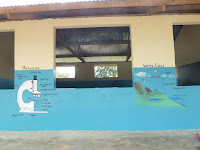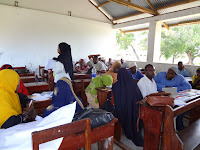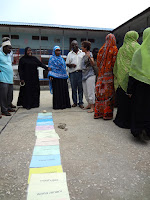 Work Finally Begins...
We hope that this entry will be
interesting to both our
educator- and
non-educator- family members and friends.
Work Finally Begins...
We hope that this entry will be
interesting to both our
educator- and
non-educator- family members and friends.
Note: *Photos: Descriptions at bottom. I haven’t figured
out how to label photos yet.
OK, time to work! An intensive secondary teacher training program is ready to go, beginning next week. Why not sooner, you may be wondering. Secondary schools have been open only infrequently since we arrived. Here's why.
This year, the
period from mid-October to mid-November included:
- the celebration of the religious holiday, Eid of Al Adha
Schools closed.
 - exams for Form 7 (14
yrs of age, the last year of Primary school.
Q: How did that affect volunteers in secondary schools? A: Secondary
school teachers invigilated (to ensure that the primary teachers did not
influence the marks). Schools closed.
- exams for Form 7 (14
yrs of age, the last year of Primary school.
Q: How did that affect volunteers in secondary schools? A: Secondary
school teachers invigilated (to ensure that the primary teachers did not
influence the marks). Schools closed.
- one week of classes. Schools open.
- two weeks of secondary exams at the Form 2
Level (Grade 10), the last year of compulsory education in Zanzibar. On this occasion, secondary teachers from one
school invigilated at schools other than their own, to protect the integrity of
the exam process. Schools closed.
Our roles as
volunteers:
Peter will be working with Heads (Principals) of three secondary
schools in the Stone
Town area to help with the development of leadership
skills. Jane will be working with a few English teachers in the same secondary
schools with teaching strategies other than the commonly used teacher-centred /rote
learning method. They will then model some of the new teaching techniques to others and so on...(‘Cascading’) with volunteer
support.
 During the couple of weeks when the schools were open, Peter
met with heads to introduce himself and to learn about each school and how it
operated. In both cases he had a chance to read, and learn about, the school’s annual plan in preparation for further discussions.
During the couple of weeks when the schools were open, Peter
met with heads to introduce himself and to learn about each school and how it
operated. In both cases he had a chance to read, and learn about, the school’s annual plan in preparation for further discussions.
We have met with a couple of Ministry of Education people.
We were aware that it was a small staff with a lot to do and little money to do
it. They took time to meet with us and discuss, over cups of tea, our roles
here. We look forward to meeting with and updating them periodically.
Jane has met with two of the lead teachers and spoken with
lots of students! Most were too shy to ask questions so, aware that their
written English was much stronger that their speaking and auditory skills, she talked
to them about strategies for listening to and practising spoken English. Most
of their questions focused on how to get funding to go to university outside of
Africa. She has told them she would look into it, but really, she doesn’t know
where to start. They are all so serious, so hopeful, desperate to succeed, and
poor.
Critical issues
related to our roles:
(This list, abbreviated and reworded, was found in a 2007
document from the Zanzibar Ministry of Education, Education Development
Program)
 - acute shortage of teaching and learning materials
including textbooks, reference books, library books, computers and laboratory
equipment
- acute shortage of teaching and learning materials
including textbooks, reference books, library books, computers and laboratory
equipment
- emphasis on National examinations, conducted at
the end of primary, basic, lower secondary and higher secondary education, encourage
rote learning-based method of teaching. Failure
rates at all levels are extremely high.
- a great shortage of qualified secondary school
teachers, particularly in science, math and English language
- about 50% of teachers at the secondary level under
-qualified or unqualified
- low teacher morale and very low pay
- weak leadership and management capacity,
including centralised decision making, insufficient number of qualified managerial
staff at the Ministry, Regions, Districts and in schools. Most heads of
secondary
schools have not had training on educational or
school management
 - English language proficiency of the majority of
students well below acceptable levels, hindering
their ability to succeed
academically and increasing
their dropout rate
- English language proficiency of the majority of
students well below acceptable levels, hindering
their ability to succeed
academically and increasing
their dropout rate
- low level
of English of most teachers
- acute shortage of classrooms and subsequent use
of double shift system, resulting in reduced instructional time
- average of 60 students per classroom
 All of these factors will make our assigned roles very
challenging!
All of these factors will make our assigned roles very
challenging!
Photos notes:
Exterior wall paintings at Mtoni by a primary school volunteer, Wendy, who
devised this solution for the combined problems of high humidity preventing anything from
sticking on walls, and the lack of textbooks. ‘Parts of the microscope’ is always
on the Exam, but the school has no
microscopes. The other photos of students, classrooms, grounds open to the public---and to ox carts---the water pipe, and the school library
where the meeting is taking place, were taken at Kiembe Samaki Sekonderi. The conditions
and facilities of a few urban schools such as these are considerably better than those of most Zanzibari schools as described in 'Critical Issues' above.

.JPG)
.JPG)
.JPG)
.JPG)
.JPG)
.JPG)
.JPG)
.JPG)
.JPG)
.JPG)
.JPG)

.JPG)
.JPG)


.JPG)
.JPG)
.JPG)
.JPG)
.JPG)
































